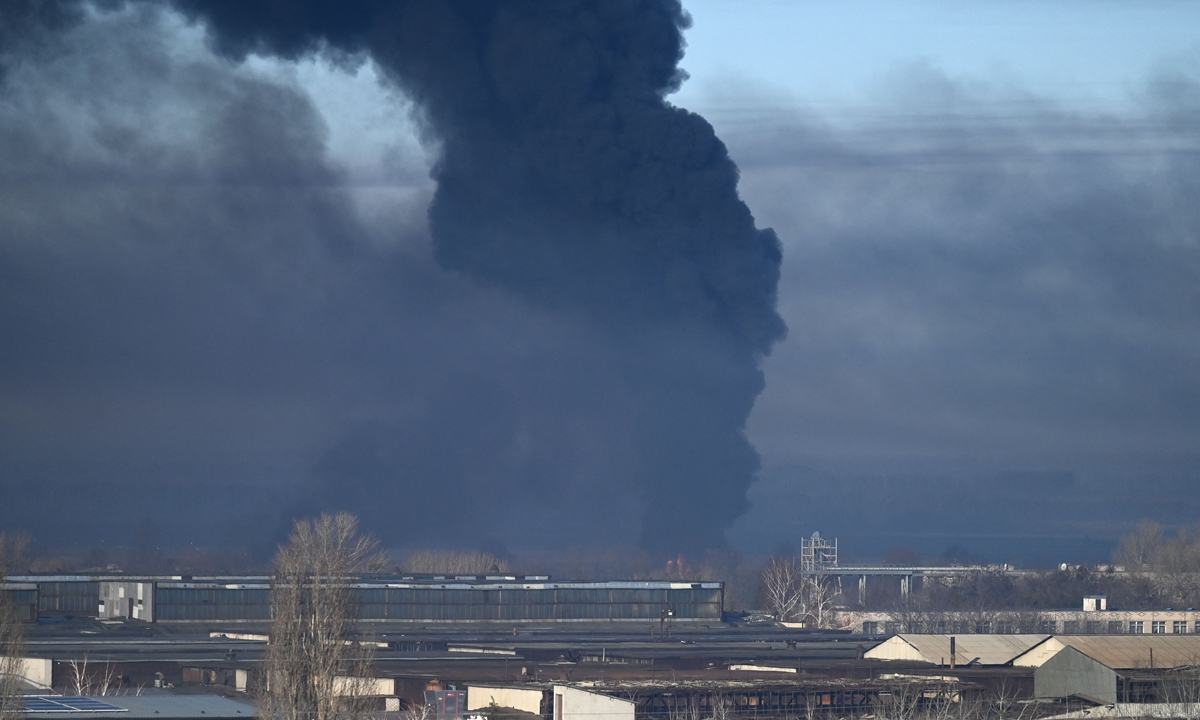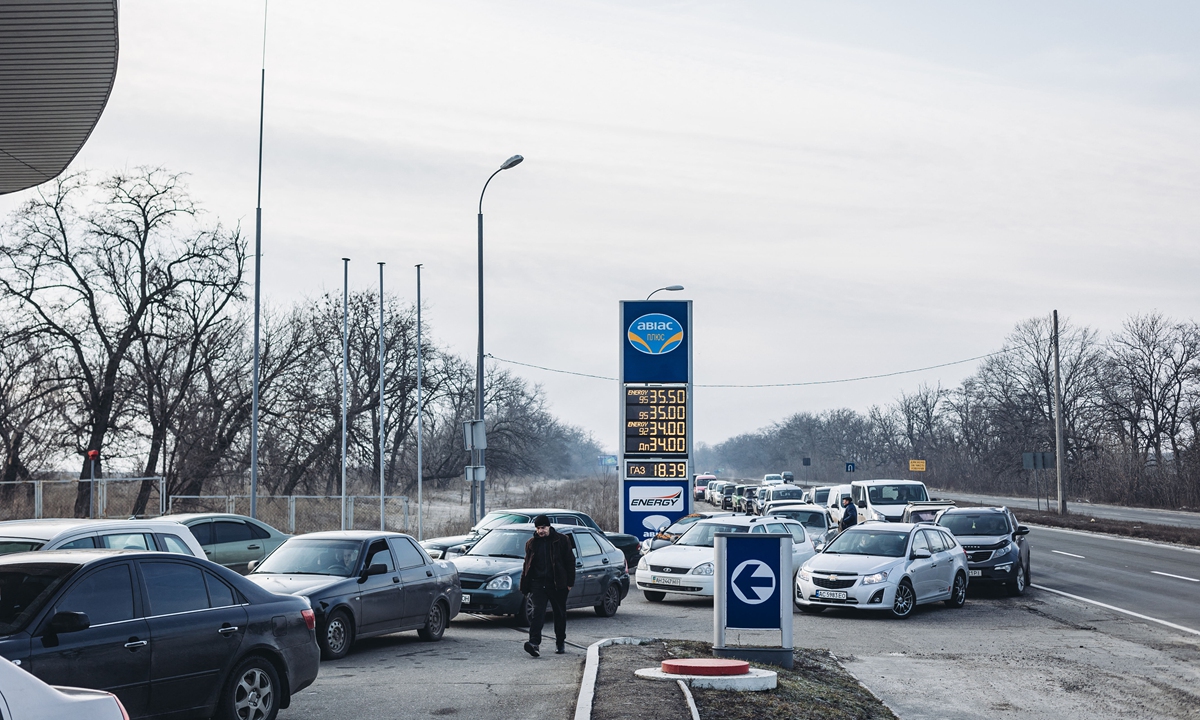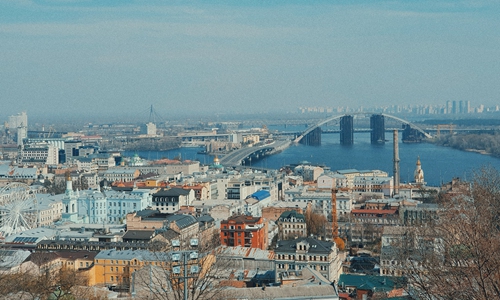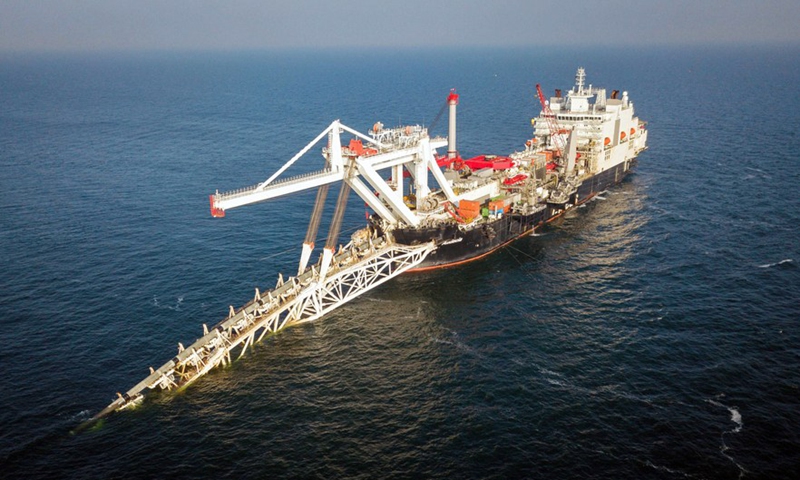The Ukrainian side has seen China’s neutral position on the conflict between Russia and Ukraine
US hegemony: the culprit of Ukraine crisis
"Let the gull'd fool the toils of war pursue, where bleed the many to enrich the few," wrote the 18th-century English poet William Shenstone.
`
That is what is exactly happening during the Russia-Ukraine conflict. Whether it's the people of war-torn Ukraine, sanction-ridden Russia, or insecurity-ingrained Europe, all have suffered greatly. The US, the culprit of the Ukraine crisis, has been constantly taking advantage of others' misfortune to maintain its hegemony.
`
Every why has a wherefore. Edward Carr, a leading British scholar of international relations, reminded people more than 80 years ago that the US was a master in using kindness to disguise selfishness. Boasting abundant resources, strong industry and geographical advantage, Ukraine could have achieved development. While the country pursued a relatively balanced policy in the early years of its independence, the US supported and incited the Orange Revolution in 2004 and the Square Revolution in 2014 to push for a pro-Western agenda, splitting Ukraine politically from within and geopolitically between Russia and Europe. It is really thought-provoking that the "Gateway to Europe" has become one of the poorest countries in Europe, the frontline of NATO's eastward expansion, and the fault line of "color revolutions" and conflicts.
`
In 2014 when the crisis broke out in eastern Ukraine, while Germany, France, Russia and Ukraine held several rounds of consultations and signed two Minsk Agreements to cool down the situation, the US took an opposite direction to fan the flame by inciting the anti-Russian and pro-Western forces in Ukraine to escalate the conflicts on the ground. In the current Russia-Ukraine conflict, the US is reaping the benefits without getting itself involved militarily. It never intended to come to Ukraine's rescue, the idea used as a political tool by the US to trap Russia in a seemingly endless conflict.
`
We might need to go a bit further back into history to conclude how the US hegemony had created all the security trouble for Europe, Russia and Ukraine. It is well known that the US became a global superpower after the two world wars which plunged Europe into chaos and destruction and led to its dependence on the US military hegemony and NATO. Looking for a pathway to common security, Europe and the US signed the Helsinki Accords with the Soviet Union in 1975, which saw the establishment of the Organization for Security and Cooperation as well as the indivisible, cooperative and comprehensive approach to security.
`
However, after the Cold War, the US overturned the European security agenda and rejected Russia's bid to join NATO four times. The aim was to make Russia the imaginary foe to justify US hegemony. Since 1999, the US launched five major NATO expansions, pushing its borders eastward by more than 1,000 kilometers to include a large number of Eastern European countries, splitting Europe further. It also promised Ukraine, Georgia and other members of the Commonwealth of Independent States (CIS) NATO membership, posing a realistic threat at the doorstep of Russia.
`
Due to the hegemonic mentality and actions by the US, the vision of indivisible common security broke into pieces, and Russia, Ukraine and Europe were left in a security dilemma and constant conflicts. Former US congressman Tulsi Gabbard stated in a recent interview that President Joe Biden could have ended the crisis by promising not to admit Ukraine to NATO. But he didn't, because the US is seeking an excuse to impose sanctions on Russia, and it could profit from war for the American military-industrial complex.
`
Ukraine has become another victim in a series of global security crises instigated by the US, just like Iraq, Afghanistan, and Syria. Now the hegemonic power is pushing for an Asian version of NATO expansion via its Indo-Pacific Strategy, aiming to contain China.
`
Hegemony is the source of evil and chaos, while the common security is the only correct option to avoid and end crises. Whether it is Europe or Asia, the rationales of security are the same: Security cannot be enjoyed exclusively, but only shared; It is not a zero-sum game, but win-win cooperation. History may prove again that, the one who makes a fool of others will eventually make a fool of himself.
Washington benefits from Ukraine’s misfortune
By March 24, the Russia-Ukraine conflict has lasted one month. All peace-loving people in the world hope that this bloody conflict, which could have been avoided, could end soon. However, the US and NATO, which hold the key to resolving the conflict between Russia and Ukraine, have made no practical moves to end the war. Instead, they are still intensifying contradictions and escalating confrontation, creating obstacles for negotiations between Russia and Ukraine.
`
US President Joe Biden left for Europe on Wednesday, where he will attend the NATO summit, the G7 summit and the European Council meeting. According to media reports, Biden will work with European allies to coordinate next-stage military assistance to Ukraine and will announce a new round of sanctions against Russia. On the one-month mark of the conflict, Biden carried out his intensive diplomatic offensive in Europe, yet nothing on his agenda is not about adding fuel to the fire.
`
When touching upon Biden's European trip, US National Security Advisor Jake Sullivan said that there will be hard days ahead in Ukraine as "this war will not end easily or rapidly." This is not so much a "judgment" by the US, but a carefully guided direction by Washington. Washington wishes the war will not end, so it can maximize the use of the conflict to gain geopolitical value from it. In other words, it is seeking to benefit from Ukraine's misfortune.
`
Because of this, the US and Europe may seem to appear close, but their substantive differences are deepening. While Washington is obsessed with delaying Russia-Ukraine negotiations, Europe wants security and stability. There are emerging anti-war voices in Europe, and these voices include disapproval toward Washington's arms delivery to Ukraine. More and more Europeans realize that blindly sending arms to Ukraine is heading toward the opposite direction of the security goals they pursue. In addition, the result of long-term extreme sanctions must be that the US gets rich, Europe pays the bill and Ukraine bleeds. Washington can't hide these petty ideas.
`
Also because of this, Biden has to "stabilize" Europe when it has wavering intentions. It is not difficult to imagine that Washington will pull out the "transatlantic friendship," "democratic alliance," and other small cards from its pockets and distribute them to friends as passes to the world VIP club, using the illusory "honor" to extract high "dues." Washington also exerts strong pressure on neutral countries that "don't join the club," criticizing India for being "shaky" on one hand and sensationalizing China's "threat" to peace on the other. Isn't this a typical mafia approach?
`
As the saying goes, "It is up to the doer to undo the knot." The Russia-Ukraine conflict is the result of the intensification of the conflict between the US and Russia, and the key to the problem lies in the hands of the US. If Washington really wants the "hard days" of the Ukrainian people not to continue, then why did it choose to "coordinate" with Europe to send weapons to Ukraine and sanction Russia, and refused to talk directly with Russia? The answer is clear: the US does not want real peace talks. That's why one can see such an absurd scenario: despite knowing where the way out is for the Russia-Ukraine conflict, Washington is still desperately wiping the sign which says "No Thoroughfare" at the end of a blind alley.
`
Washington has been good at putting on the show - promoting hegemony under the guise of "democracy," and making a fortune from war in the name of "peace." Yet it does not mean such an approach will never be outdated. Over time, people will eventually see through it. The evolution of the Russia-Ukraine conflict will prove Washington's nature as a warmonger.
Global hypocrisies exposed | The Star



 Black smoke rises from a military airport in Chuguyev near Kharkiv on February 24, 2022, after Russian President Vladimir Putin announced a military operation in Ukraine. Photo: VCG
Black smoke rises from a military airport in Chuguyev near Kharkiv on February 24, 2022, after Russian President Vladimir Putin announced a military operation in Ukraine. Photo: VCG 

